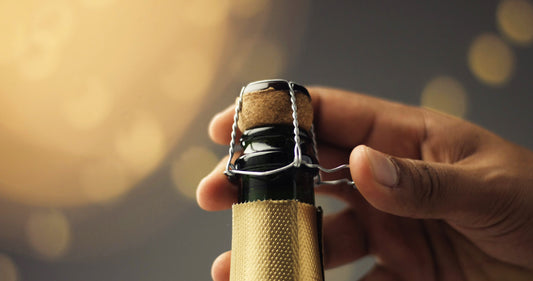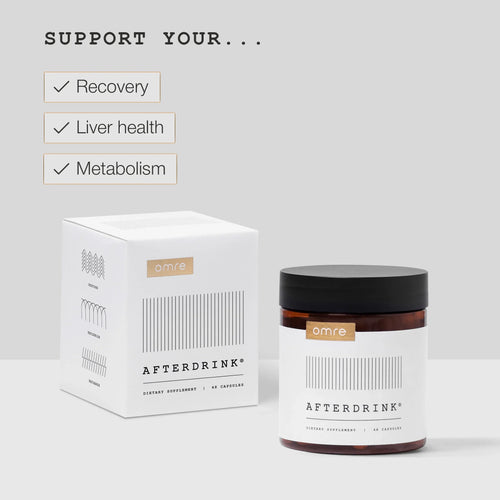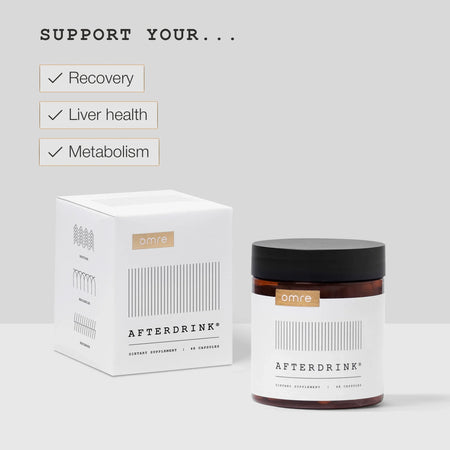Table of Contents
Champagne hangovers are arguably one of the worst. Why are champagne hangovers bad and how can you get rid of them?
If you’re asking these questions, you’re not alone. Since the time of Dom Pérignon (yes, he was a real person), hangovers after a few too many glasses of champagne have been experienced by most of us.
In this article, we’re going to take a closer look at whether champagne hangovers are worse than other types of alcohol. We’ll then move on to all the things you can do to prevent a champagne hangover, as well as tips to get rid of them.
With so many hangover cure myths, it’s hard to separate the facts from the fads. That’s why we’ll base our content on published research papers and highlight things that don’t work.
So, with the introductions out the way, let’s get straight into our guide on everything you need to know about champagne hangovers.
Afterdrink®
A supercharged antioxidant designed to support recovery, made from the very best, research-backed ingredients on the market.*
Does Champagne Give You a Hangover?
Champagne can give you a hangover due to its alcohol content and carbonation, which accelerates alcohol absorption. Symptoms include headaches, dehydration, and nausea. Drinking in moderation and staying hydrated can reduce the likelihood of a hangover.
Champagne hangover symptoms
Champagne hangovers, just like any other type of alcohol, are caused by drinking at a faster rate than your liver can handle.
As a result, your blood alcohol concentrations start to rise which makes you feel drunk and the damaging effects of alcohol start to take place.
Here are some of the ways in which scientists agree are the cause of hangovers:
1. Dehydration
One of the main causes of a champagne hangover is dehydration. Alcohol blocks the release of a hormone called vasopressin from your pituitary gland. This gland is located in your brain and vasopressin is responsible for making sure water is reabsorbed into your bloodstream from your kidneys. Therefore, when alcohol blocks the release of vasopressin, you get excess water loss from your kidneys. Hence why drinking alcohol can cause dehydration.(1)
2. Inflammation
Inflammation is another key cause of a hangover. When alcohol is broken down in your liver, toxic by-products such as acetaldehyde are formed. Acetaldehyde is highly volatile and reacts with your cells causing inflammation. This process is known as “oxidative damage” and has been shown in studies to be partly responsible for your hangover symptoms.(2)
3. Sleep disturbance
Sleep disturbance is an overlooked cause of hangovers. We all know that falling asleep after a couple of drinks is easier. However, the quality of sleep that follows is significantly less than if you hadn’t drunk any alcohol. The reason is that alcohol blocks your brain from reaching the REM stage of sleep and this is essential for having a fully rested mind.(3)
In combination, the above-mentioned causes of a hangover result in the following symptoms:
- Nausea and vomiting
- Headache
- Anxiety
- Body pain / Muscle aches
In fact, there are over 40 symptoms of a hangover which you can read about in our article here.
Are champagne hangovers worse?
So, are champagne hangovers worse than other types of hangovers?
Hangovers are ultimately caused by drinking too much alcohol and if you drink enough of any type of alcohol, you’re going to get one.
That said, there are certain types of alcohol that are well-known to give worse hangovers. For example, red wine hangovers are notoriously bad.
Champagne has a reputation for giving bad hangovers. And although there are no official reasons why it should do, there are some theories as to why champagne hangovers could be worse than other types.
1. Fizzy drinks potentially increase alcohol absorption
Some studies suggest that carbonated drinks like champagne increase how fast alcohol is absorbed into your bloodstream.(4)
Peaks and troughs in blood alcohol concentration can wreak havoc on your digestive and endocrine (hormone) systems and this could potentially explain why champagne causes worse hangovers.
With that said, there are studies that refute the fact that carbonated drinks increase alcohol absorption. Therefore, the jury is still out on this topic.
2. Congeners
Alcohol congeners could be another reason for bad champagne hangovers. Congeners are natural by-products formed during the fermentation and aging process of alcohol. It’s what gives certain types of alcohol their distinctive taste and aroma. Darker-colored drinks typically have a higher concentration of congeners. And unfortunately, congeners have been shown to make hangovers a lot worse.(5)
In summary: Although unproven, it's possible that champagne hangovers are worse because of congeners and the fact its fizzy.
Champagne hangover remedies
So, you’ve gotten carried away and had a few too many glasses of champagne last night? What can you do to get rid of your champagne hangover?
Next up, we’ll share some remedies that will help soften the blow.
1) Rehydration mix
We all know that drinking water is essential when hungover. If you’ve been drinking all night and have not taken steps to rehydrate yourself before going to bed, you’re guaranteed to wake up dehydrated.
A great way to rehydrate is to use rehydration mixes. They contain a specific ratio of electrolytes and sugar that promote rapid hydration.
2) Ginger
Ginger is a research-backed natural anti-nausea remedy. Nausea is arguably one of the worst symptoms of a champagne hangover. And if it’s a problem for you, sipping on ginger tea or taking a ginger supplement could help.(6)
You can read more about these benefits in our article about ginger for hangovers.
3) Painkillers
Painkillers containing Acetaminophen (e.g Tylenol) and Ibuprofen (e.g Advil) will help reduce muscle aches and headaches when hungover. These drugs do come with side effects you should be aware of. So, always check the information leaflets before taking them.
In summary: Trying to get rid of a champagne hangover can be difficult because, by the time you’ve woken up, most of the damage from alcohol has been done. Therefore, rest, rehydration, and painkillers are your best bet.
Afterdrink®
A supercharged antioxidant designed to support recovery, made from the very best, research-backed ingredients on the market.*
Things to avoid
Although there isn’t much you can do to get rid of a champagne hangover once you’ve got one, there are a few things you may want to avoid.
1) Exercise
Doing exercise to “cure” your champagne hangover is not the best approach. Many people believe that you can “sweat out” a hangover. Unfortunately, there is no scientific basis for this and it doesn’t work. In fact, it could make you feel more unwell as you unnecessarily stress your body out more.
So next time you decide to go for a run when hungover, you may be better off just resting instead.
2) Coffee
It may sound like the right thing to do, but drinking coffee when hungover has its downsides too. You’re right in thinking it’ll give you an energy boost and make you feel more alert. However, caffeine is a diuretic like alcohol, meaning it’ll make your kidneys flush out more water again. In addition, caffeine is a stimulant that may make hangover shakes and anxiety worse.
For a more detailed look into this, read our article on coffee for hangovers.
3) Drinking more alcohol
The infamous bloody mary is the poison of choice for some when hungover. But it could do you more damage than good.
Hangover symptoms start when your blood alcohol concentration reaches zero. Technically, drinking more alcohol may give the impression that it is helping your champagne hangover. However, Drinking more alcohol wreaks havoc on your insides and only delays the inevitable hangover. So it's best to stay away from the hair of the dog!
How to prevent a champagne hangover?
Trying to get rid of a champagne hangover once you’ve already got one is not the best approach. When it comes to hangovers, prevention is always better than trying to “cure” your symptoms.
The best way to prevent a champagne hangover is to drink less and at a slower rate. If you give your liver a chance to process alcohol, the risk of waking up with a hangover is much lower.
Keeping well hydrated by alternating each glass of champagne with a glass of water will help rehydrate you. In addition, eating a meal before going out is very important for slowing the absorption of alcohol from your gut.
Champagne side effects
Champagne side effects may include headaches, nausea, and dehydration from its alcohol content. The carbonation can increase alcohol absorption, potentially leading to quicker intoxication. Overconsumption may also cause dizziness, stomach irritation, and long-term effects on liver health. Moderate consumption reduces risks.
Best champagne for no hangover
If you’re looking for champagne that will not give you a hangover, unfortunately, it doesn’t exist.
Whether it’s Moët & Chandon, Bollinger, or Dom Perignon, all champagne will give you a hangover if you drink enough of it.
Champagne hangovers – Final words
That brings us to the end of our detailed look into champagne hangovers, why they happen, and everything you can do to get rid of them.
We’ve gone through some potential reasons why champagne hangovers can be worse than others. In addition, we’ve walked you through some tips on how to get rid of champagne hangovers.
Ultimately, champagne hangovers are a sign from your body that you’ve been drinking too much in a short period of time.





